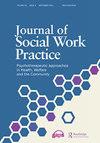The acceptability of non-abstinent treatment goals among clinical social workers in the United States
IF 1.4
4区 社会学
Q3 SOCIAL WORK
引用次数: 3
Abstract
ABSTRACT Research on acceptability of non-abstinence goals has focused primarily on addiction counsellors and lacks representation of clinical social workers (SWs). We examined whether acceptability of non-abstinence varied as a function of a client’s severity of substance use disorder (SUD) diagnosis (severe vs. moderate), finality of an outcome goal (intermediate vs. final), and type of substance (e.g. alcohol, cannabis) among clinical SWs in the US (United States). We surveyed a geographically representative sample of 309 SWs (Mean age = 48.9; Female = 76%; Mean years practicing = 14.6). For tobacco, alcohol and cannabis use, most SWs (51%–84%) rated non-abstinence as an acceptable goal regardless of finality of the outcome goal for clients with a moderate SUD; but smaller proportions rated non-abstinence acceptable for clients with severe SUD regardless of drug type or finality of the goal. Higher ratings of acceptability of non-abstinence were significantly associated with younger age and lower drug use stigma. Supporting clients who pursue non-abstinence is consistent with the values of the Social Work (SW) profession (e.g. self-determination, social justice, dignity/self-worth, importance/centrality of human relationships). Thus, SW education and training programmes should bolster understanding SUD recovery can take multiple pathways, should be self-directed and empowering, and may be defined in terms of improved health and wellness.美国临床社会工作者对非戒断治疗目标的可接受性
摘要:关于非禁欲目标可接受性的研究主要集中在成瘾咨询师身上,缺乏临床社会工作者的代表性。我们研究了在美国临床SWs中,非禁欲的可接受性是否随着客户物质使用障碍(SUD)诊断的严重程度(严重与中度)、结果目标的最终性(中等与最终)和物质类型(如酒精、大麻)的变化而变化。我们调查了309名具有地理代表性的SWs样本(平均年龄=48.9;女性=76%;平均执业年限=14.6)。对于烟草、酒精和大麻的使用,大多数SWs(51%-84%)将不禁欲评为可接受的目标,无论中度SUD客户的结果目标是否最终确定;但对于患有严重SUD的客户来说,无论药物类型或目标的最终性如何,都有较小比例的人认为不禁欲是可接受的。不禁欲的可接受性评分越高,年龄越小,吸毒耻辱感越低。支持追求非禁欲的客户符合社会工作(SW)职业的价值观(例如自决、社会正义、尊严/自我价值、人际关系的重要性/中心性)。因此,软件教育和培训计划应加强对SUD恢复可以采取多种途径的理解,应该是自我指导和赋权的,并且可以从改善健康和身心健康的角度来定义。
本文章由计算机程序翻译,如有差异,请以英文原文为准。
求助全文
约1分钟内获得全文
求助全文
来源期刊

Journal of Social Work Practice
SOCIAL WORK-
CiteScore
2.50
自引率
7.10%
发文量
39
期刊介绍:
The Journal of Social Work Practice publishes high quality refereed articles devoted to the exploration and analysis of practice in social welfare and allied health professions from psychodynamic and systemic perspectives. This includes counselling, social care planning, education and training, research, institutional life, management and organisation or policy-making. Articles are also welcome that critically examine the psychodynamic tradition in the light of other theoretical orientations or explanatory systems. The Journal of Social Work Practice is committed to a policy of equal opportunities and actively strives to foster all forms of intercultural dialogue and debate.
 求助内容:
求助内容: 应助结果提醒方式:
应助结果提醒方式:


